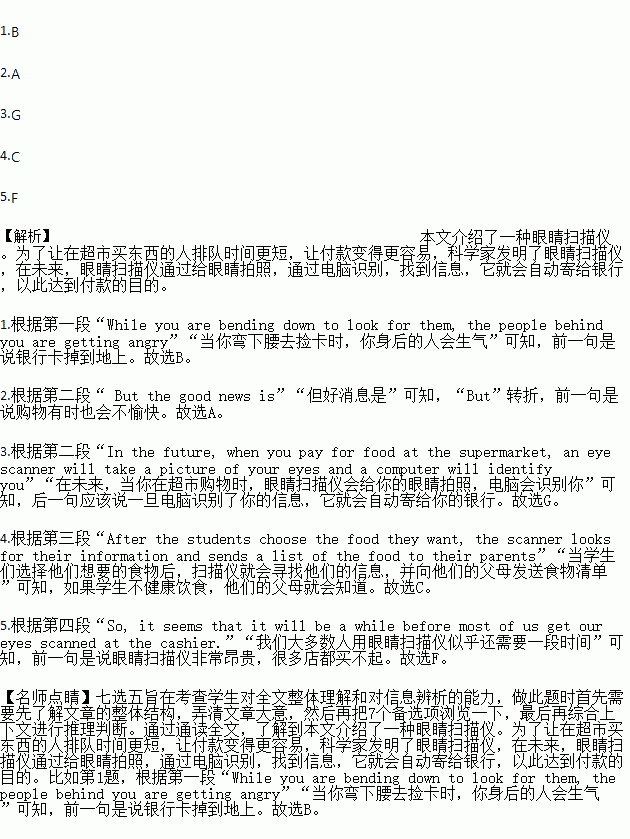题目内容
You wait in a long queue in the supermarket, but when it’s finally your turn to pay, you can’t find enough money in your purse. 1. While you are bending down to look for them, the people behind you are getting angry. The cashier is pounding her fingers impatiently on the counter.
2. But the good news is: scientists have thought of a way to make queues shorter and paying for things easier. They have invented an eye scanner. In the future, when you pay for food at the supermarket, an eye scanner will take a picture of your eyes and a computer will identify you. 3.
Students at Venerable Bede School, England, have already got an eye scanner in their cafeteria. After the students choose the food they want, the scanner looks for their information and sends a list of the food to their parents. 4. Also, parents pay for the meals at the end of the week, so the students don’t have to take money to school and wait in long queues to pay for their lunch.
If all shops had eye scanners, shopping would be easier. 5. So, it seems that it will be a while before most of us get our eyes scanned at the cashier.
A. Sometimes shopping can be unpleasant.
B. You take out your credit cards, but they fall on the floor.
C. If students aren’t eating a healthy diet, their parents will know.
D. Stores are trying several new ways to get shoppers to spend more.
E. Parents are urging the government to introduce better security safeguards.
F. However, eye scanners are very expensive and many shops can’t afford them.
G. As soon as the machine finds your information, it will send it to your bank which pays for your food automatically.
How Can I Fight Laziness?Lazy people will never gain anything in life. However, laziness can be defeated once a few changes have been made in your mind.1. Many people lack sleep constantly, since they stay up too late and get up too early to prepare for work. These people have little motivation once they arrive home. Laziness works hand in hand with a lack of motivation and a tendency to put off things. By adjusting your sleep schedule to provide a few more hours of meaningful rest, you can fight laziness throughout the day.Another way to fight laziness is to change your mind from passive to active. Some people treat their lives as if they were pushed from task to task. Others take a more positive approach, viewing each task as a challenge they must overcome alone. 2.Some people fight laziness by removing the temptations(诱惑) that surround them. A television in the living room may provide entertainment, but watching too much TV often contributes to laziness. 3. Complete a few tasks and reward yourself with what you enjoy, such as a good dinner or a film.Laziness can also be a lasting problem at home. Couples and children may all have different energy levels, but laziness can be spread if not dealt with immediately.4. Be the first to collect and wash dishes after a meal. Others in the home may eventually follow your example and perform their own task. It is difficult to practice laziness when you are surrounded by motivated people.5. Enough exercise and a balanced diet can help you to develop a healthy lifestyle, thus enabling you to have more energy and help lift your spirits.
A. To fight family laziness, set an example. |
B. Knowing how to fight laziness is important. |
C. One way to fight laziness is to get enough sleep. |
D. Finally, taking exercise regularly can help you fight laziness. |
E. With strong determination, you will be able to achieve your goal. |
F. Laziness appears when you no longer feel in charge of your own mind. |
G. Create a reward system for yourself, just as parents do for a child. |
最近你班就高三学生是否应该组织集体春游进行了讨论。以下是讨论的情况。请你用英语写一篇短文,反映讨论结果并谈谈自己的看法,然后发表在你校英语论坛上。
赞成(62%)的理由 | 反对(38%)的理由 |
1. 亲近大自然,拓宽视野; 2. 增强沟通、合作能力; 3. 结交新朋友。 | 1. 占用宝贵的学习时间; 2. 安全很难保证。 |
注意:词数100左右(开头已给出,但不计入总词数)。
Recently, our class has had a discussion about whether Senior Three students should go on a group spring outing.
____________________________________________________________________________________________
____________________________________________________________________________________________
____________________________________________________________________________________________
____________________________________________________________________________________________
____________________________________________________________________________________________
____________________________________________________________________________________________
____________________________________________________________________________________________
_________________________________________________________________
Yours,
Li Hua


 the general reason for these air safety rules?
the general reason for these air safety rules?